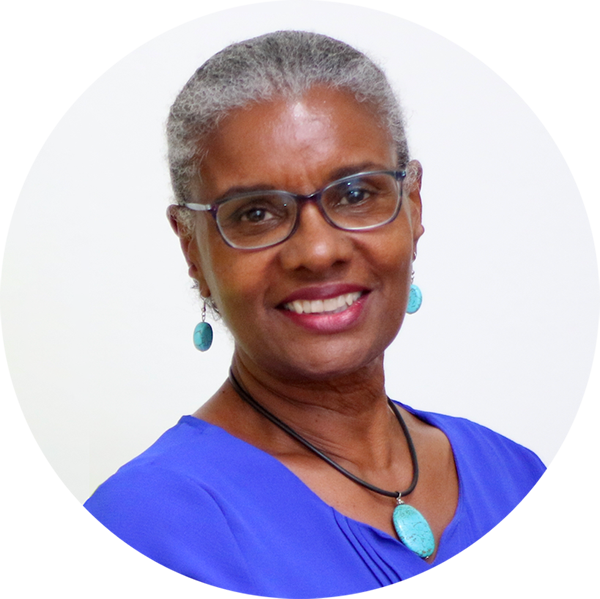Home > Doula Profile: Barbara King
Doula Profile: Barbara King
Barbara King has lived in the Caribbean for more than 40 years, having spent her school years in London. She now lives in Trinidad and Tobago, a twin island state in the Caribbean, near the coast of Venezuela. The islands have a combined population of 1.3 million and host a cultural mix of African, Indian (from India), Syrian, Chinese, and, more recently, Venezuelan populations. There are currently three INELDA-trained doulas who live there.
Q&A with Barbara
When and why did you decide to become an end-of-life doula?
I first heard the term “death doula” in a conversation with a friend, and I thought “I’d love to do that!” She later sent me an Alua Arthur video and I was sold. This was around 2019. I’ve been fascinated by death, life after death, and anything to do with the spiritual side of it since I was a teenager—so I added death doula to my “wanna be” list, but I had no idea how that was to happen.
Also, in 2019, my mother was hospitalized in London, and it looked like she was going to be making her exit. I was at a loss about what to do—the logistics of it. “What happens after? Who do I call? What do I have to do? Where, when, how?” I realised that I had reached my 60s and was uninformed and unprepared about this very natural process that we all have to go through. Fortunately, mum recovered. The experience was an eye-opener for us both, and we started to talk about death and to put things in place for the inevitable future point when death did come for her. She made a formal will. We talked about burial, and I discovered, to my surprise, that she wanted to be cremated. She selected her casket, designed the funeral she wanted, and paid for it to make sure she got what she wanted.
Then came the pandemic. I got COVID in mid-2021—a mild version, fortunately—and during the obligatory two-week quarantine here, I came across an article about death doulas that mentioned INELDA. I immediately went to the website, selected the earliest course I could take, and began the application process.
How long have you been doing this type of work?
I completed my training with INELDA at the end of October 2021 and immediately began to look for opportunities to practice the skills. After some research I discovered a palliative care unit at a local hospital and applied to be a volunteer. There were lots of background checks to be done, and I guess they had to work out how to utilize an end-of-life doula, a title completely new to many in Trinidad and Tobago. However, the work of serving the dying has been a strong tradition in indigenous and religious communities for possibly centuries. All that took about six months.
It is now just over a year since I have been doing weekly visits to the palliative care unit, a 12-bed hospice setting. That has involved spending time with patients either directly conversing about preparing for the end of life, hearing stories about their lives, or sitting in prayerful silence with those who are no longer able to communicate. In two cases where the patients returned home for their final days, I was able to do home visits, which gave me the opportunity to engage with family members in a way I don’t normally get to in the unit.
Mel Dore, another INELDA-trained doula, works with me to cohost a monthly virtual Death Café and a midmonth virtual meetup called Life, Death, and Everything In Between, where we have guest speakers on topics related to death and dying. We started the Death Café in July 2023 to begin the process of normalizing conversations about death. The interest was such that we started the midmonth sessions and had a very good response. We now have more than 120 registered members in the community.
What type of environment do you work in?
A palliative care unit in a 12-bed hospice setting and home visits on occasion.
What do you do before you meet with a new client?
I have a routine for mental and spiritual preparation, which I carry out when I leave home and when I arrive at the hospital. It involves centering with breathing or meditation to clear my energy, and requesting spiritual protection and guidance. I remind myself that the people I am about to encounter are nearing the end of life and I am present to listen attentively and to be of help. This is important because I never know what I will encounter. A patient who was alert and jovial on my last visit might not be in the mood to talk this time. Someone who was walking around and talking about going home might now be bedridden and sad.
I usually set myself a task like: be observant, listen deeper, or take time to reflect between patients. I might also set a desire to expand my experience, for example, connect with a member of the staff, or seek out and listen to a visiting relative rather than the patient.
Once I’m in the unit I usually connect with someone on the medical team to discuss the patients most likely to benefit from my presence and get some background information. Then I stroll around the unit greeting patients generally and feeling the vibe of the day before sitting with the first patient.
Can you share a short anecdote or insight that changed you?
The first patient I was assigned was Allison. She had breast cancer, which had spread to the lungs and brain. She was a lively and comedic 50-something who was delighted to have someone to talk to who was not a patient or a doctor. I got to know and use my doula toolkit with her for three months. One day I visited and she had a couple of close friends at her bedside. One was tearful as she was speaking, and the other looked very sad. Allison was keeping the conversation going but she looked irritated. After the visitors left she let out a sigh of exasperation. She told me “criers” made her feel bad because they sit at her bedside and cry, then go home to get on with their lives, leaving her there in pain and depressed, thinking she is going to die soon. She spoke of friends who called her every day, and she joked that they were only calling to check that she was still alive. She did not want anyone around her feeling sorry for her. Visitors were expected to distract her from her painful reality.
That caused me to think again about how my conversing about death might be received. I became more conscious of my tone, vibe, and body language. I experimented with ways of introducing myself that didn’t sound like I was only there to talk about dying, and I dropped the notion that I was only there to focus on death. That has allowed me to lighten up. Now I look for opportunities to use things that come up in natural conversation as an entry point to end-of-life matters, but most often with a lighthearted or curious tone. Sometimes I don’t talk directly about dying or death at all. At other times it just so happens that it’s the only thing we talk about and that is the only time I meet that patient before they transition.
Who has been one of your teachers or mentors?
I can’t think of any one person who has been a continuous mentor or teacher, other than the INELDA facilitators. I try to attend every INELDA monthly mentoring session, webinar, and the BIPOC group that meets bimonthly. From the facilitators and other doulas I have been able to get greater clarity about what it means to be a doula and how I can be a doula in my circumstances. Every session adds something to my understanding of what is possible, my role, and how I can be a doula in my own way. The patients I encounter are also great teachers. They have taught me about being nonjudgmental and patient, and what they need from me.
What do you wish you had known when you started as a doula?
That I’m not going to be able to jump right in at once and get started doing this work for clients. I knew that when I finished the training. The trainers said that often. But it was only when I started reaching out to get started that it really hit home that this is going to take time—lots of time—and patience. I have to educate and advocate in my space before I can expect to create a practice that makes a steady income.
Do you have any words of encouragement for fellow doulas?
For those new to this: “Don’t give up.” The value of this work is immeasurable. Allow time to find what/where the right fit for you. Maybe you have to create something entirely new, a unique way of being an end-of-life doula, or stretch the concept of the work. Is your thing animals? Children? Insurance? Finances? Fashion? Conversations and services around death and dying need to happen everywhere.
What is your dream for your practice or doulas in general?
My dream for my practice is constantly unfolding and being embellished. I have been an educator and facilitator for most of my working life. That’s what I enjoy. I think this is where I can have an impact to increase death literacy and pave the way for the work of death doulas to be recognized as an essential service. My big, bold dream is to collaborate with various sectors to have trained end-of-life doulas accessible in every community in Trinidad and Tobago.


